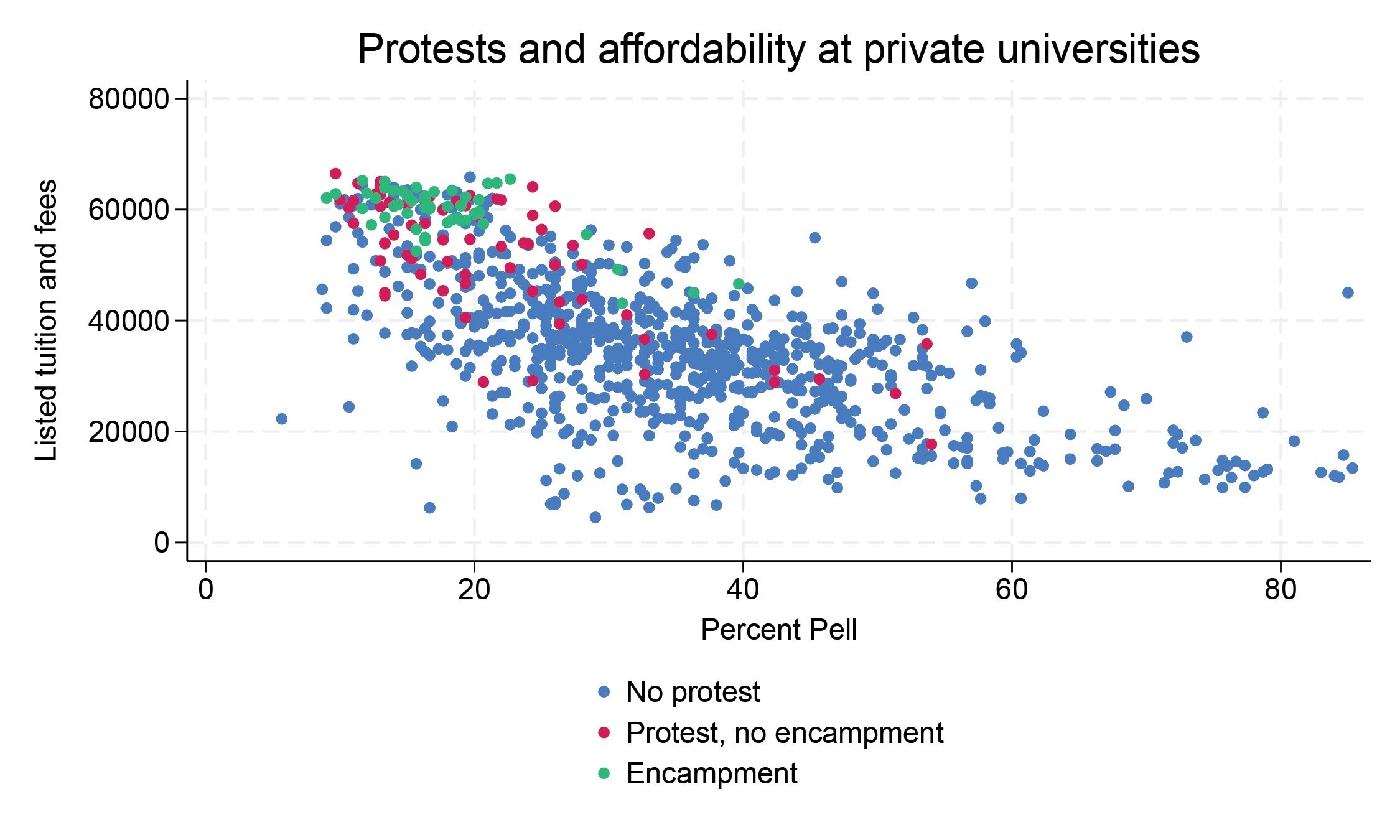Israeli Institutes Should Partner with HBCUs and Tribal Colleges
Image source: https://washingtonmonthly.com/2024/05/24/are-gaza-protests-happening-mostly-at-elite-colleges/
The image shows affluent schools (less Pell Grant) were more likely to engage in protest and encampment.
Edited by Ori Gold
As universities most associated with generational wealth protest Israeli defense and boycott Jewish-associated businesses, Israeli institutions should take it as a lesson to diversify their investments. While prestigious schools such as Harvard, Columbia, etc. remain at the forefront of innovation and thus should not be undervalued, Israeli institutions should create new ties to schools serving lower-income students, especially Historically Black Colleges and Universities (HBCUs) and Tribal Colleges. Such partnerships would not only combat harmful anti-Israel and antisemitic rhetoric, but also advance innovation and educational prospects.
Recently, Washington Monthly pointed out that anti-Israel protests are rare among low-income schools. Of the total 1,421 nonprofit colleges, only 318 (22%) had protests, and 123 (9%) had encampments according to data from Harvard’s Crowd Counting Consortium. The data depicts a wealth gap: those protesting are typically richer than those who aren't. Turns out that students at HBCUs and Tribal Colleges have better things to do.
Consider how far money invested in increasingly anti-Israel institutions will now go. Those who have tried to “follow the money” funneled into these protests have found there’s a whole lot of it coming from various nefarious orgs. Columbia protests are synonymous with multi-millionaire participants—James (Cody) Carlson, Isra Hirsi, Isabel Jennifer Seward and Isabella Guisti, to name a few—as well as people studying nonsense majors like “poetry through a Marxian lens.”
Israeli institutions can invest better.
In addition to the challenge of Israeli institutions competing with anti-Israel money at these affluent schools, consider the financial and reputational damage already done to these schools. Schools that entertained tentifadas were plagued with vandalism. There were millions of dollars in damage to schools like UW and WWU. Though anti-police, anti-capitalism, anti-fossil fuels and other causes were all lumped together at these protests, the commonality was blaming Zionism and Israel. We shouldn’t continue to pay for people who want us dead.
Many business owners cited concerns with hiring from student protesting, people willing to destroy their own homes to make a political statement. Israel should listen to them.
As it turns out, schools that not so long ago held Jewish quotas are not our best allies. The Ivys—Harvard, Yale, Princeton, Columbia, Pennsylvania, Dartmouth, Cornell, and Brown University—imposed quotas to limit the number of Jewish students admitted since the 1920s. A hundred years later, these schools have become the face of the anti-Israel movement, with chants to boycott, ban, and even murder "Zionists" echoing throughout their hallowed halls.
The anti-Israel protests are open about holding anti-normalization policies. Why argue with the silent treatment? Or worse, why argue with people who repeat anti-intellectual chants? In the words of Choose Yourself, “Stick with the people who love you. And don't spend a single second on the rest.”
During the US Civil Rights Era, Zionist Jews stood at the front of marches for minority rights. Jews back then knew a thing or two about disenfranchisement. Jewish values, of which Zionism is an integral part, promote justice. I’m not sure if MLK Jr. said, “When people criticize Zionists, they mean Jews.” I am, however, certain he was a Zionist, supported by other Zionists, both Black and Jewish.
We need to return to Black-Jewish alliances and create Native-Jewish alliances. We don’t need to care about the ultra wealthy, elitist institutions.
HBCUs and Tribal Colleges were historically undermined by the US itself. So it’s no surprise the world overlooks them, too. They do poorly on college rankings, in part because their students are more likely to drop out in lieu of financial stability. I get the desire for a TAU or Reichman student to want to study a class at UPenn, but they may have a more valuable experience at a black school in Tennessee, where classes are more intimate.
Washington Monthly highlights that at the 78 HBCUs, 64% of the students receive Pell Grants. None of these institutions have had encampments, and only nine have had protests. This data does not reveal how BIPOC students feel about Israel; it simply presents an opportunity to improve those feelings, whatever they are.
Investing in HBCUs and Tribal Colleges offers several advantages for Israeli Institutions, not limited to fostering a more diverse and inclusive advocacy network for Israel. Yes, it means encouraging people of color to visit Israel, to see its ethnic and religious diversity. It means encouraging more Natives to learn about Jewish ties to the land, and about the similarities between Jewish and Native cultural practices. Imagine the impact if Jewish agencies like Birthright moved some funding from Jews visiting their homeland to underprivileged students. Consider who benefits most from financial aid and a subsidized vacation. We have an educational and fun means to improve our representation when we need it.
The returns on this investment will be quickly clear. Collaborating with institutions that serve black and Native people would lead to new, meaningful initiatives benefiting all parties. HBCUs like North Carolina A&T State University and Tuskegee University are partners for tech and aerospace advancement. Howard University, at the heart of DC, is a vital asset for political partnerships. Navajo Technical University and United Tribes Technical College would be amazing partners for Ben-Gurion University of the Negev and Weizmann Institute, furthering sustainable practice and better land management.
In the same way that Israel was the first (and only) country to airlift Africans outside of warzones, Israel should be the first to prioritize investment with underserved people of other states, whether it’s BIPOC and Natives in the US or even Christians, Kurds, Copts and other forgotten MENA groups. We all benefit from a more balanced and resilient network of partners. Israel should learn to save its innovation and financial backing for universities who care to protect Jewish students, not those who guide their ethics by what’s hot on social media.


